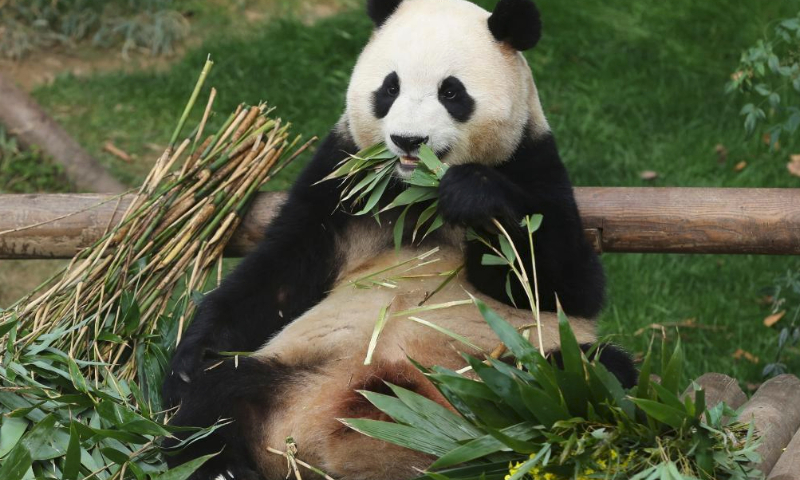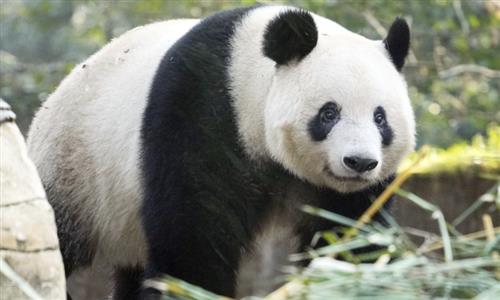ARTS / CULTURE & LEISURE
Fu Bao fervor continues in S.Korea two weeks after panda's return to China

Giant panda Fu Bao eats food at Everland theme park in Yongin, South Korea, March 3, 2024. Fu Bao is scheduled to return to China in April. Photo: Xinhua
It has been two weeks since the international giant panda celebrity Fu Bao arrived in Chengdu in Southwest China's Sichuan Province by a chartered flight from South Korea. The chubby princess continues holding the attention of people in both countries.
The Seoul Metropolitan Government has received 10 petitions filed by citizens asking to bring Fu Bao back to South Korea. The suggestions include having the city government funding rental of Fu Bao from China, the Korea Times reported Monday.
"I ask the city government to enable citizens and Chinese tourists to see Fu Bao at the Seoul Grand Park to share friendship," a citizen surnamed Kim wrote on the Sangsangdaero Seoul website, an online platform for citizens to make suggestions to the city government.
Born on July 20, 2020, Fu Bao was the first panda in South Korea to be born through natural breeding. Under the terms of the giant panda research cooperation program, all giant pandas born overseas should be returned to China before turning 4 years old. Giant pandas usually enter maturity and become sexually mature around this age.
During Fu Bao's time in South Korea, she gained massive popularity, gradually evolving into a symbol of friendship between the two countries. Chinese netizens loved following Fu Bao's life overseas and expressed appreciation for the good care she received.
Along with Fu Bao, Fu Bao's breeder in South Korea, Kang Cheol-won, who was affectionately given the nickname "Panda Grandpa" by Fu Bao fans, has gained huge popularity in China as well.
To welcome Fu Bao home, large screens in Chengdu, Chongqing, and Beijing were lit up. These large screen advertisements were purchased by Fu Bao fans from both China and South Korea. In order to help Fu Bao re-adapt to life in his ancestral hometown Sichuan, during the one-month quarantine period, two Chinese keepers will remain on call along with Kang, who accompanied the giant panda on her flight from South Korea to China. The seamless cooperation between Chinese and South Korean zookeepers in ensuring Fu Bao's safe transfer back to China speaks volumes about the effective communication and understanding between the two countries.
Across Chinese social media platforms such as Sina Weibo, under the topic of "giant panda Fu Bao," netizens' enthusiasm for sharing posts and discussions remains high. While Chinese fans are eager waiting for Fu Bao to make her public debut in the country, many also noted that Fu Bao fans in South Korea needn't worry. Fu Bao is China's national treasure, and there are also many people in China who love her.
Among some top-rated comments, Chinese netizens noted that Fu Bao surely will not forget her "grandpas," or breeders, in South Korea. And Fu Bao fans can rest assured that Chinese breeders will take good care of the panda as well. Some netizens are also inviting her South Korean fans to visit her in China after the quarantine ends.
As the first panda in South Korea to be born through natural breeding, Fu Bao is more than just a zoological milestone. She has transformed into a symbol of the friendship and cooperation between China and South Korea. Moreover, Fu Bao has become a bridge linking the people of the two nations through more people-to-people exchanges and cultural tourism.
As Fu Bao adapts to her new home in the lush greenery of Sichuan, we see not just the journey of a panda but the bridging of two cultures. Her legacy, and that of her caregivers from both countries, will continue to inspire and remind us of the ties that bind us together.

